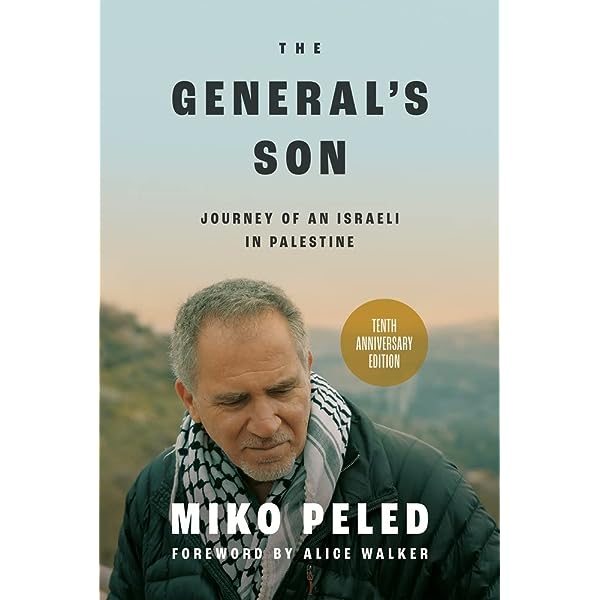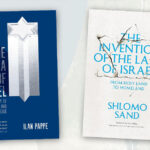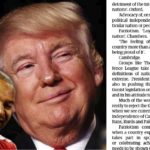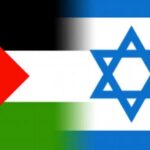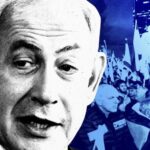The General’s Son, Journey of an Israeli in Palestine
By Miko Peled
To paraphrase DH Lawrence, though Miko Peled writes of checkpoints and warfare, of wheelchairs and death, of humiliation and pride, of violence and peaceful protest, of enmity and friendship and of justice and injustice his theme is humanity. His journey is an external and an internal journey of discovery of others and also of self: for him and, I suggest, for readers.
Reading his book made me angry, frustrated, tearful and very slightly and cautiously optimistic. It also made sense of some things I had witnessed.
But why that title? Before Miko’s father, Matti Peled, became known as an academic Arabist and campaigner for peace he had been a strikingly strong Israeli general. Exercising military power and control were not, however, addictions from which he suffered, though wanting to win arguments might have been.
Looking back to 1967 we see a country, encouraged and prompted by Miko’s father, choosing war, winning and gaining territory. Afterwards Miko’s father saw the need for peace, friendship and return of territory. Too many of his colleagues did not. To be an Israeli general or military hero is to be a potential politician. To
be an Israeli politician it is possible that you will have been a general or military hero. Empathy is not a prominent requirement in the person specification of generals and military heroes. Miko’s father was exceptional. Once out of the army he never again put on his uniform physically or psychologically, unlike some others.
Among the many powerful scenes described so effectively in this book is one where Miko is in the West Bank, experiencing for the first time the brutality meted out by Israeli soldiers: the army that, as a child and young man, he admired as the best and most moral army in the world now behaving inhumanly.
He receives many such shocks as he proceeds on his journey. He also, courtesy of his elder brother, unlearns some of Israel’s constructed history: the sustaining myths of David defying Goliath. I remember growing up equating Israel’s wars to the Battle of Britain: so heroic.
Helping to distribute five hundred donated wheelchairs in Israel and an equal number in Palestinian Bethlehem he does not expect to be arrested on his return to Israel. But he is. Trying his hardest with friends to get into Gaza from Egypt with medical supplies he frustratingly fails. The Egyptians have closed the border at the request of the Israeli government. Later he finds out why:
Operation Cast Lead is about to be launched (whoever thought up the name of that operation?). One hundred tons of bombs are dropped on a very small and overcrowded place: in effect a large prison which continues to suffer beyond our imagining and yet out of our sight. How many BBC reporters go there? How much time has peacemaker Blair spent there? As Miko says, even a one-ton
bomb can destroy a block of apartments. I remember getting an email at the time from a young Israeli friend who was learning Arabic saying ‘please don’t think I agree with any of this but I am one of very few.’ She was right: there were no repercussions for the politicians. It was a popular operation.
I had to smile at his description of the delay getting into Israel from Jordan. I was also delayed at the same border post. But no one pointed a gun at me. They did at him: the son of a famous General. If they had known that my colleague and I had arrived via Damascus things might have been different for us. I think (I have
lost count) that I have been to Israel thirty six times over thirteen years. My only reason for going now would be to see dear friends, including people with whom I strongly disagree but love.
The International Professional Development Association (ipda) once awarded a prize to one of my students who is now principal of a secondary school in East Jerusalem. I presented it to her in Jerusalem. Out of the window we could see a settlement. People were late arriving for the ceremony. I was impatient. I had
travelled almost two and a half thousand miles to get there so why were they late? Checkpoints? Surely that meant only a few minutes lateness? Read Miko’s book and you come to understand that checkpoints sometimes involve hours of waiting but are only part of the problem. If, because of what are clearly racially based decisions, you are not permitted to travel on certain roads to get to work or to meet friends or to take a child to hospital a journey that ought to take minutes can take hours; and this in your own country.
But surely all these Palestinians are terrorists wanting to kill decent Jews? Chomsky’s Journalist from Mars, free from the official narratives of the powerful, would identify a different group of terrorists. Even with all of his family background and his experience in the USA of mixing, arguing, disputing and finding common ground with Palestinians Miko Peled is physically and
emotionally unsure as he first crosses into occupied territory.
Perhaps his biggest shock is the normality of human engagement and hospitality that he encounters: doctors being doctors, nurses being nurses, teachers being teachers and farmers being farmers. He does not, and is not made to, feel like an enemy. And yet he must witness the inhumanity of their treatment by his own
compatriots and by the army of which he was once so proud.
This is not really a review: it is a response from a reader. And I have left out so much, including his karate classes for Palestinian children, his barely controlled temper when ignorant soldiers casually shoot and mistreat children, his hurt when friends are killed, his devastation when his sister’s thirteen year old daughter is killed by a suicide bomber (I had to stop reading at that point), his
love of family and friends and, despite it all, or perhaps because of it all, his assertion of his Jewishness as something to be proud of.
Miko wants an inclusive enlarged secular state. Any so-called two-state solution will be occupation by another name. Perhaps we could arrange for certain politicians to be locked up together to read this book. Miko Peled is by no means the only Israeli travelling such a journey. But few started with a father such as his and few have gone so far. Buy and read. Be angry. Be sad. But, perhaps,
after you have wiped your eyes, you might be ever so slightly hopeful.
A final thought: his mother in her garden growing plants: not a house or a garden stolen from a Palestinian family (she had the chance of that but utterly rejected it as immoral) but close to what was the village of Dier Yassin where the Palestinian inhabitants were massacred in 1948. I think of the growth of her plants as I think of the growth of the values that her children are propagating.
Cliff Jones, January 2014
Subscribe
Click here for a secure way to sign up, you will be supporting independent news. Click the button below.
Your Opinions
Disagree with this article? why not write in and you can have your say? email us
